We return for our fourth year covering Sundance! Here’s what Kevin Cookman and Aya Lehman saw while they were on the ground for the first half of Sundance 2020
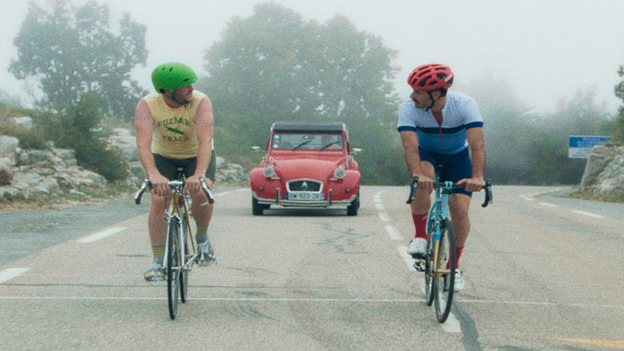
THE CLIMB
Dir. Michael Angelo Covino
It’s difficult to explain THE CLIMB—everyone (including myself) was lead to believe that it was simply a movie about two lifelong friends on a bike trip. This is just the first act of the film, the rest of the story takes our two protagonists through several important moments in their lives, separate and together. Films about friendship are difficult to nail, but THE CLIMB successfully captures the nuance of that relationship with the person who’s going to be in your life forever, come Hell or high water. The failings in the piece are primarily connected to the direction—Michael Angelo Covino wrote, directed, and stars in the film, and it falls into the normal trappings of an extremely male production: the women are naggy and far too hot for their respective partners, hardly contributing anything of note to the story besides exposition and acting as plot motivators. But overall it’s an impeccable story about the complexities of friendship and it accomplishes a relationship that few films have mastered. [Aya Lehman]

CUTIES
Dir. Maïmouna Doucouré
Someone, please, call the police, call the executioner, call God, because, honestly, Maïmouna Doucouré’s CUTIES feels like an illegal print buried deep in a studio’s warehouse, like something along the lines of I LOVE YOU, DADDY or SOUL MAN. Call me prude, but I don’t like one bit that a production team of adults sought to create a space, a trite pseudo-neorealist one at that, where children (11-year-olds) were directed to twerk! That’s the whole movie: a tween dance team learns raunchy dance moves. The display of dance is one thing, but the invasive, sexualized gaze of Doucouré’s camera is another entirely, as the lens drapes up and down each of the children’s bodies as they lustfully convulse. God, ew, it’s creep-o shit even having to describe it. And all for a conclusion that ultimately states “don’t be slutty you dirty whore; here are some socially acceptable ways to show a little skin and not shame your family, as a treat”? Enough! Initially, the film presented The Cuties as flawed kids clumsily engaging with the newfound social nobility of nubility, but by its end I realized it was a warning against ever associating with these young girls, as if they’re lost causes to glean life lessons from and leave in the cold immediately thereafter as you ascend to a higher plane of moral purity and clarity—floating, floating, floating. Its saving-grace glimpses into a Senegalese experience in Paris are illuminating, if simplistic, but it all surrounds a pivotal moment wherein our tween protagonist eavesdrops on her weeping mother while hidden under the bed, with only ankles in the camera’s view. It’s a moment so rich that Doucouré had to break it out again from a previous short film for her feature debut. Irregardless: jail! Everyone, jail, now! This is coming out on Netflix, and if there wasn’t already a list of reasons to put those execs on a watchlist, then might I suggest the acquisition and distribution of CUTIES as Exhibit A. [Kevin Cookman]
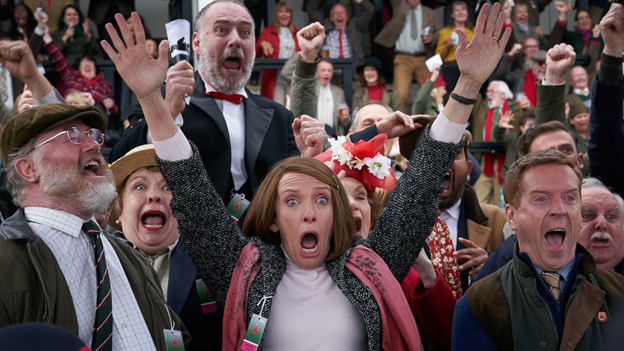
DREAM HORSE
Dir. Euros Lyn
There’s really not much to be said about DREAM HORSE—it’s a very average, based-on-a-true-story film about a community in Wales who pool together to raise a racehorse. It’s a lovely film, it’s exactly the kind of thing my mom will rent at Redbox in a matter of months. Toni Collette is wonderful, per usual, but who’s surprised. The racing sequences are naturally rather predictable, but they add a layer of exciting texture to this otherwise rather one-note film. That said, there’s nothing as comforting as a nice UK community film. Horse girls come collect your movie. [Aya Lehman]

JUMBO
Dir. Zoé Wittock
What if that Transformers spin-off, BUMBLEBEE, spent all of its time with Steinfeld trying to figure out how she can fuck the Transformer? Zoé Wittock’s JUMBO starts like MANDY, its multi-colored dazzle of enrapturing attraction lighting teasing a hallucinatory rendering of the assaultive ephemera of a carnival as psyche, but the end result is closer to a SHORT CIRCUIT. JUMBO is a film with the same emotional oomph as the screencap panels on the back of a VHS tape, the film utilizing slow motion to ensure that you don’t miss a single bit of transformative, exaggerated emotion. Like the conception of many festival films, JUMBO is composed of four clever moments and a “*sigh* I guess I’ll fill in the rest” attitude to the connective plot; Wittock is equipped with a far-too-dedicated Noémie Merlant, bringing a lovely and deeply felt pain to what may have actually been described on the page as a “quirky outsider” and a French theme park with a slick ‘n oily whirly-ride ready to take her for a spin. On one hand, I really like that Merlant is immediately attracted to Jumbo, cutting right to the meat of the story, but on the other hand, she is immediately and puzzlingly horny for this theme park ride. The choice to pit Merlant’s struggle to embrace and trust sexual touch, not to mention the emotional vulnerability that comes with it, with a capital-C Comedic relief mother character brutalizes any of JUMBO’s minor successes as a portrait of finally finding love, for the self or to another. It’s very loud in the wrong spots and completely silent in regards to its most potentially explosive ideas. But, hey, there’s a killer shot where two characters are engaged in doggystyle sex and we slowly see it in the reflection of a picture frame on the opposite wall and I haven’t stopped thinking about it! Art, cinema, fluids! It’s hard to fully fault a charmer, but I really hope PORTRAIT OF A LADY ON FIRE takes off so Merlant never has to do these precious indie dramedies again. [Kevin Cookman]
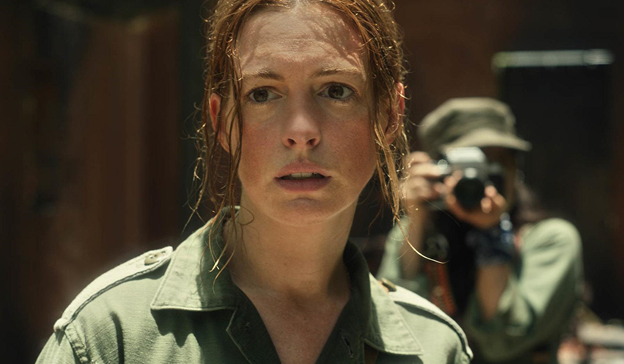
THE LAST THING HE WANTED
Dir. Dee Rees
Dee Rees is one of our finest modern filmmakers, a director who, with only two films under her belt, has made historic strides in reflecting the Black experience onto the framework of classical American cinema. MUDBOUND was one of the unsung darlings of 2017, a softly radical descent into the pangs of white guilt and the racist incentives of capitalist America. So can someone tell me what the fuck went wrong with THE LAST THING HE WANTED, a Joan Didion novel translated as an Anne Hathaway globe-trotting noir? The plot is supposed to follow Hathaway as a cut-throat journalist with a focus on Central American conflict falling into the sins of her weapon-smuggling father, played here by a Willem Dafoe who’s been directed to be in a different film altogether. The simplest description of the story is already confusing; while I can sense a pass at this that feels like an UNCUT GEMS-styled descent into worse and worser decisions inflicted by hereditary habits, THE LAST THING HE WANTED plays like an episode of ABC’s Wednesday night programming. Rees’ images, once rich and ruminative, are flat and washed-out here; her camera tends to soar through rooms and hallways at a breakneck pace, but the fluidity is merely cosmetic when none of these spaces are thoughtfully explored. THE LAST THING HE WANTED tosses plotting to the wind, instead dedicating each of its act breaks to escalating the levels of uncontrollable, manic chaos. I’d be hard-pressed to find a sequence this year as baffling as when Anne Hathaway delivers an aircraft of landmines to Costa Rica only to go full “Karen” on the recipients when they refuse to provide direct payment. A dog is obliterated by a landmine, the bit actor hamming it up as a gun-runner keeps calling her “Mrs. Claus,” and we realize that we have no remote clue how we even got to this scene. As the locales take a turn for the tropical and Hathaway’s intentions feel more and more muddled, the mood errs closer and closer to 2019’s notorious Hathaway misfire, SERENITY, but at least Knight’s trashy swing at tuna-erotica aimed for the fences. Rees walks up to the plate with three attempted bunts and a clean strike-out—her latest is a boring mess that fails to even morbidly fascinate. [Kevin Cookman]
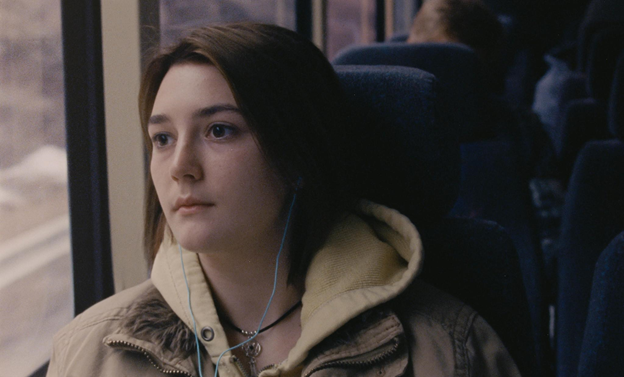
NEVER RARELY SOMETIMES ALWAYS
Dir. Eliza Hittman
Autumn is 17 years old, pregnant, and, worst of all, living in a man’s world. At Sundance, Eliza Hittman’s terrific NEVER RARELY SOMETIMES ALWAYS was reduced in daily parlay to “the abortion movie,” but the director’s debut, a portrait of aggrieved honesty and newly forged faith in your fellow woman, is so much more. What’s most curious is where Hittman establishes her characters’ challenges. Paying for the medical procedure and booking an appointment is merely a series of off-screen cash hand-offs in easily booked appointments with sweetly supportive staffers. It can certainly be read as a vision of an incredibly fortunate young woman, making the actual medical process look so easy that NEVER RARELY SOMETIMES ALWAYS feels like a Planned Parenthood advertisement meant to combat the retro pro-lifer tape a Pennsylvanian doctor tries brainwashing Autumn with. Autumn and her accompanying cousin, Skylar, are stranded homeless in New York City for nearly three days, sure, but their time is spent in bowling alleys, arcades, and police-monitored train station waiting areas. In other words, it’s convincingly miserable, but never histrionic. In the hands of a female filmmaker, artificially constructed sources of trauma are no match for the naturally occurring daily traumas of a hostile patriarchy, be they micro or macro. The trip goes surprisingly well, but only relative to previous arthouse narratives that pride themselves on the filthy “illegal abortion set-piece.” I almost fell into the trap of considering the film slight, but NEVER RARELY SOMETIMES ALWAYS is a masterful encapsulation of the moment in a friendship that silently defines it. The three days Autumn and Skylar share will not be immediately identified as the most important three days in each other’s lives, but come 40 years or so down the line, the impact will fully kick in. This is your most crucial memory. With stunning turns from newcomers Sidney Flanigan and Talia Ryder, a refreshingly banal vision of a washed-out Manhattan, and a stirring original score by Julia Holter, NEVER RARELY SOMETIMES ALWAYS is a feat in collaborative trust. [Kevin Cookman]
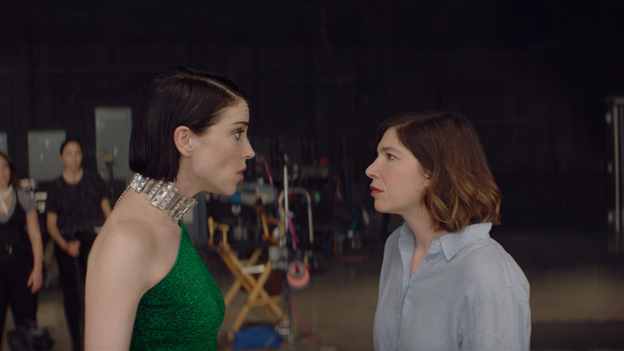
THE NOWHERE INN
Dir. Bill Benz
The antidote to MISS AMERICANA, St. Vincent and Carrie Brownstein’s collab THE NOWHERE INN evokes the POPSTAR: NEVER STOP NEVER STOPPING irony but takes the celebrity mockumentary formula several steps forward. The “concert documentary” has always been a bizarre genre—jumping between performance footage and backstage interviews, there’s always that uncomfortable feeling that the artist is staring you down and, a la Dee from IT’S ALWAYS SUNNY, screaming “tell me I’m good, tell me I’m good, tell me I’m good.” THE NOWHERE INN sees this trend and goes the exact opposite direction. Co-writer Carrie Brownstein noted their desire to go “as unlikable as possible” for the character of “Annie Clark” as she is portrayed in the film. Certain lines feel like they’re in direct response to Taylor Swift’s MISS AMERICANA, from Annie declaring “I want to control the narrative” to demanding more say in how other people perceive her. The absurdist qualities don’t always play and, maybe because I saw it at a midnight screening, at a certain point you’re like “that’s enough Miss St. Vincent.” But God she and Carrie Brownstein are charming, and the strength of their friendship is palpable. The highlight for me, though, was the unexpected appearance of Dakota Johnson as Annie’s girlfriend. It’s a miracle I was not removed from the theater. If you love St. Vincent you’re guaranteed to love this movie, as the charms of her onstage persona and the real Annie Clark are on full display, and her music pulsates just below the surface of every scene. [Aya Lehman]
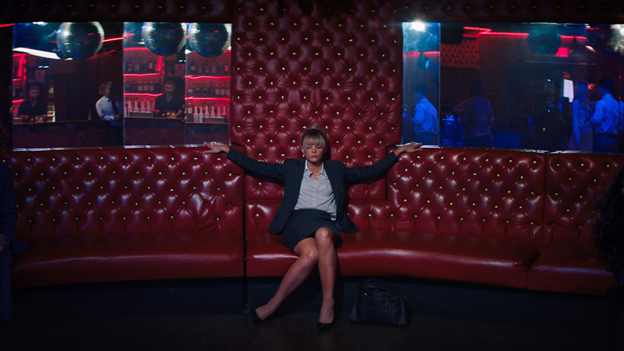
PROMISING YOUNG WOMAN
Dir. Emerald Fennell
When I first watched the trailer for PROMISING YOUNG WOMAN I went directly to the IMDb App to confirm it was directed by a woman. Within the first 15 minutes of the film there’s no doubt that it is—Emerald Fennell’s influence is palpable and so clearly inspired by a need to make women feel comfortable in this theater. The subject matter at hand is extremely fraught and potentially triggering, and while there’s no surefire way to prevent it, Fennell does her absolute best work to make the experience digestible to a mass audience while remaining faithful to the core group of women the film was made for. Carey Mulligan is terrifying and hollow in a way that is so familiar and so haunting, but her ability to show her character growing soft while maintaining a hard exterior is yet another testament to her abilities. She demands to be rooted for, she is endlessly compelling to watch and engages the eye at every opportunity she receives. The Bo Burnham “Stars Are Blind” scene has been endlessly spoken of and for good reason—Burnham solidifies himself as an iconic rom-com star in one scene inside a pharmacy. It’s reminiscent of the insanely charming Blockbuster scene from THE HOLIDAY and further proves the fortitude of a woman’s skill in telling romantic stories. This scene will be forever canonized in the rom-com hall of fame. The entirety of PROMISING YOUNG WOMAN will be extremely contentious, but the ending will open the floodgates for an extremely important discussion on how we handle women’s trauma on screen. [Aya Lehman]
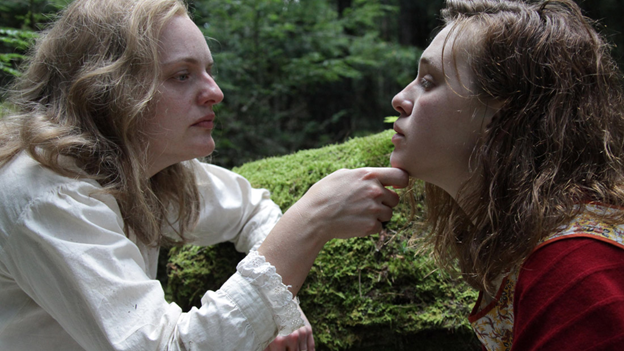
SHIRLEY
Dir. Josephine Decker
S H I R L E Y !!! Josephine Decker is BACK, baby, with a film that is basically this meme in 107 minutes! My brief time at Sundance 2020 was all about women and SHIRLEY had me bewilderedly whispering “WOMEN” as the credits rolled. It’s a bit unsettling how relatable Elisabeth Moss’ titular Shirley is—her profession is writer but she won’t write, she won’t leave her bed, she bemoans social interaction, yet we are introduced to her on her throne: surrounded by admirers at a party as she nurses her drink, nestled cozily in her armchair. Thus is the timeless allure of Shirley Jackson. Shirley finds solace in Rosie (Odessa Young), the wife of a young professor (TOP TIER WHITE BOY OF THE ‘10S LOGAN LERMAN STILL KEEPING IT TIGHT) come to stay in her house and study with her husband (papa Michael Stuhlbarg). It is a grueling tale of female friendship, of womanhood, and the darkness that stands by the door of every room you can’t exit. Look, I love a macabre examination of the most intimate bonds between women, but god damn I am sick of ~sapphic vibes~. I am sick of teasing homoeroticism. These are two extraordinarily different relationships, so either go full-tilt, this-is-queer-cinema or leave it be. Overall, SHIRLEY is hauntingly fun, with exceptionally over-the-top performances from Moss and Stuhlbarg. [Aya Lehman]
















Comments